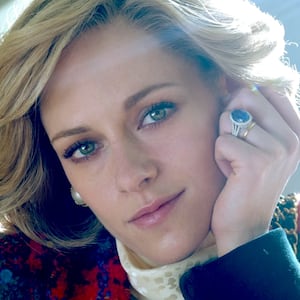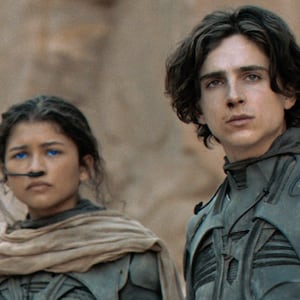It never fails to surprise that the Academy, which boasts in its membership the most thrilling and creative storytellers alive, has made it an annual tradition to produce a corny, cringy Oscars nomination announcement, with actors Leslie Jordan and Tracee Ellis Ross the proud standard-bearers/victims Tuesday morning.
But, in a rare instance, that’s neither here nor there because the 2022 Academy Award nominations are—dare I say it—pretty good? At least, considering the grain mountain of salt a film lover should take these things with, in terms of Oscar voters’ tastes and how things were trending ahead of Tuesday’s announcement. (See the full list here.)
There are few things the Academy loves more than to shower mediocre movies with many nods while pretending your favorite film of the year didn’t even exist. This year they…did less of that than usual? In any case, the surprises, for once, were overwhelmingly good ones.
As expected, the nominations were dominated by Netflix’s The Power of the Dog, which scored 12 nods. Dune earned 10, with Belfast and West Side Story racking up seven each—again, hardly a shock. But what are the other major storylines? Below, we unpack the biggest surprises, snubs, storylines, and curiosities.
Kristen Stewart In, Lady Gaga Out!
I don’t think I would have landed on this year’s Best Actress lineup in six Wordle guesses. That’s owed to how strong and fluid the category’s been all season, not to mention the hardest to predict—as proven by the fact that Jennifer Hudson (Respect), Alana Haim (Licorice Pizza), Rachel Zegler (West Side Story), and, especially, Lady Gaga (House of Gucci) missed out.
All had been nominated for and/or won major prizes in the leadup to the Oscars, but the biggest shock was Gaga, who not only campaigned harder than any performer this year but is the only contender to score what’s considered every crucial precursor nomination that would ordinarily guarantee a nod. It’s also a surprise that Kristen Stewart, who had critics baffled when she was omitted from all of those same lists, showed up for playing Princess Diana in Spencer.
It goes to show that those traditional bellwethers aren’t as reliable as they once were. (Joining Stewart in the category are Jessica Chastain for The Eyes of Tammy Faye, Olivia Colman for The Lost Daughter, Penélope Cruz for Parallel Mothers, and Nicole Kidman for Being the Ricardos).
Jane Campion Makes History
It’s outrageous that this is the case, but Jane Campion is now the first (and, obviously, only) woman to be nominated twice for Best Director. Her nod for helming Power of the Dog comes 28 years after her nomination for The Piano in this category. She’s also nominated this year in the Best Adapted Screenplay category.
“Drive My Car” Is a Surprise Oscars Darling
Ask any critic what they thought the best film of the year is, and they’d probably tell you Ryusuke Hamaguchi’s Drive My Car. Ask them if they thought that meant it was a Best Picture frontrunner at the Oscars, and they’d laugh in your face.
The tension between critics and awards voters is as much an Oscars tradition as red carpet glamour, Billy Crystal singing silly songs, and Meryl Streep. Few predicted that the reviewer support for a Japanese film with a nearly three-hour run time and a box office of under $1 million would break through with voters, especially since international features are still a rare inclusion in the Best Picture race.
But Drive My Car didn’t just land the big Best Picture nod; it also surprised in Best Director and Best Adapted Screenplay, in addition to Best International Feature.
Beyoncé Is (Finally) an Oscar Nominee
No one has been a more dutiful supporter (perhaps campaigner) of the Academy Awards than Beyoncé, who has performed at multiple ceremonies even though voters have rejected several of her submissions for Best Original Song—and one Best Actress bid, for Dreamgirls—over the years. The most recent exclusion was her ballad for The Lion King remake, “Spirit.”
But in a particularly competitive year, she finally scores her first Oscar nod for co-writing the track “Be Alive” for King Richard. Nods for fellow powerhouses Billie Eilish, Lin-Manuel Miranda, Van Morrison, and Diane Warren (never bet against her, especially if you’re unsure the movie she’s nominated for actually exists) meant that the likes of Ariana Grande, Kid Cudi, Jennifer Hudson, and Jay-Z missed the cut.
“Flee” Pulls Off a Historic Hat Trick
The animated Danish documentary Flee, about a gay man revealing his past experience of fleeing his home country of Afghanistan, is the first film to score nominations in the seemingly disparate categories of Best Documentary Feature, Best Animated Feature, and Best International Feature. The range!
“The Worst Person in the World” Defeats Aaron Sorkin
One of the most delightful surprises of the morning was the stunning Norwegian romantic drama The Worst Person in the World—we’ve been swooning over it here at the Beast—making it into the stacked Best Original Screenplay category. It’s assumed that the heavyweight it unseated is Being the Ricardos, which was written by Academy Golden Boy Aaron Sorkin.
Given how allergic many critics were to Sorkin’s fast-and-loose historical fictionalizing (that J. Edgar Hoover scene…) and how enamored they were by Joachim Trier and Eskil Vogt’s inventive, devastating screenplay, this somehow felt like the universe righting some creative wrong. At the very least, a personal win for me.
What to Make of “Being the Ricardos”
Few awards-baiting films were as divisive this year than Being the Ricardos (that title, though, is ultimately reserved for Don’t Look Up). Despite polarizing reviews and several rounds of backlash, Being the Ricardos was a major player in precursor awards and a sizable hit for Amazon, leading pundits to predict it would be all over Tuesday’s nominations. It was… but it also wasn’t.
Surprise nominations in the acting categories for J.K. Simmons and Javier Bardem, alongside Nicole Kidman’s sure-thing nod, indicate that voters were bullish on it. But then it missed out in the key categories of Best Original Screenplay and Best Picture, which is rare for a film that garnered so much support for its actors. Some award publicists have some ‘splaining to do.
Big Year for Married Couples
Jesse Plemons’ inclusion in Best Supporting Actor was a bit of a surprise, as much of the attention this year has been on his Power of the Dog co-star Kodi Smit-McPhee. But his mention there means he’ll join his wife (and Power of the Dog co-star) Kirsten Dunst on the red carpet as one of two married couples who are both acting nominees. The other is Penélope Cruz and Javier Bardem, who were hardly shoo-ins for Actress and Actor for their films (Parallel Mothers and Being the Ricardos, respectively). While married couples have been nominated in the same year before, this is the first time there are two pairs.
And Openly Gay Performers!
Kristen Stewart (Spencer) and Ariana DeBose (West Side Story) are the first openly LGBT actors to be nominated in 20 years, since Ian McKellen’s 2002 nod for Lord of the Rings: The Fellowship of the Ring. (Lady Gaga and Angelina Jolie, both of whom are bisexual, have also been nominated for Academy Awards. Others, like Elliot Page, came out years after their nominations.) It also marks the first time two openly LGBT performers have been nominated in acting categories in the same year.
Jessie Buckley Is the Biggest Acting Surprise
What may go down as the biggest surprise nomination was actually the first name read on Tuesday morning: Jessie Buckley for The Lost Daughter. Many had predicted Belfast’s Caitriona Balfe or Passing’s Ruth Negga in that slot, and perhaps foolishly underestimated the Academy’s helplessness in resisting nominating Judi Dench for Belfast. Still, it was considered a win for critics who championed Maggie Gyllenhaal’s directorial debut and were hoping Buckley’s performance could stealthily break through.
Big “Snubs” in Best Documentary and International Feature
It’s hard to use the word “snub” in the technical sense in categories that were so competitive, but two of the year’s heaviest hitters in their fields—Nat Geo’s documentary The Rescue and Asghar Farhadi’s Cannes winner A Hero—were glaring omissions. Nat Geo has a strong track record in Best Documentary, and The Rescue was a pandemic hit. And Farhadi is a past Oscar nominee. The muffled groans you heard around 8:35 this morning were the collective sound of pundits realizing their nomination Bingo cards were ruined by these categories.
The Confusing “West Side Story” Snubs
Listen, West Side Story certainly did well with its seven nods. But Don’t Look Up, of all films, getting an editing nod instead is one of the morning’s biggest hmmm’s. It’s also a bummer that Tony Kushner’s magnificent adaptation is excluded from Adapted Screenplay—though that’s a tight category as it is.
What Did Denis Villeneuve Have to Do for a Directing Nod?
Dune picked up an impressive 10 nominations, including Picture, Adapted Screenplay, and a slew of technical categories like Editing and Cinematography. When every piece of the film, from the costumes to the sound to the camerawork and script, is nomination-worthy, how does it make sense that Denis Villeneuve’s directing was not?
“Nightmare Alley” Over “Tick, Tick…Boom!” (and “Spider-Man!”) in Best Picture
The general consensus in the Best Picture category was that there were eight pretty safe bets for nominations, like them or not: Belfast, CODA, Don’t Look Up, Dune, King Richard, Licorice Pizza, The Power of the Dog, and West Side Story. This is the first year of the Academy’s return to a guaranteed 10 nominees, and no one seemed to agree on how those last couple slots would shake out.
Spider-Man: No Way Home launched an aggressive campaign of the people—“We’re the movie that people actually saw this year!”—and it was argued that an expanded lineup was meant to make it so these kinds of crowd-pleasers aren’t overlooked. Others looked at the surge of support for Tick, Tick…Boom!, which got a crucial Best Editing nod in addition to one for Andrew Garfield’s performance, and thought maybe the charming movie musical would get in. Other contenders included smaller indie fare like The Tragedy of Macbeth and The Lost Daughter.
But, in addition to the surprise of Drive My Car, which had a legion of passionate supporters that likely helped it score a nod, it was Guillermo del Toro’s Nightmare Alley that took the last slot. While it performed well in the technical categories, it wasn’t rewarded in any of the major categories and, generally speaking, was tepidly received upon its release. It was hardly the obvious choice for Best Picture.
And This Year’s Oscar Villain Emerges…












